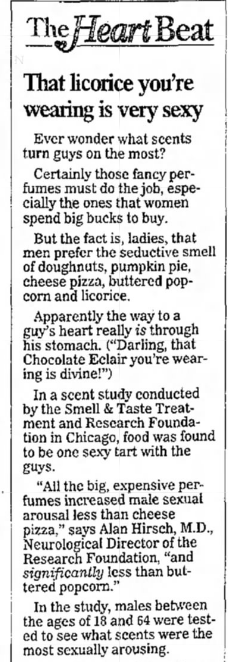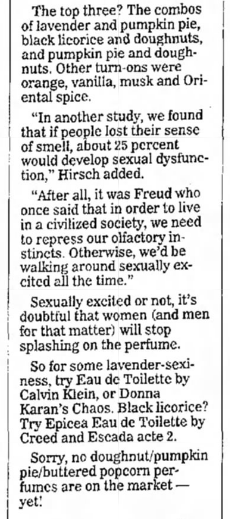Smells and Odors
Best Scents for Sexual Arousal
The article dates from 1997 (The Daily Herald Chicago, Illinois 21 Aug 1997, Thu Page 97), but an actual scientific paper from the same people was posted in 2014. If any WU-vie can cite more recent reasearch, please do so!

Posted By: Paul - Sun May 16, 2021 -
Comments (4)
Category: 1990s, Twenty-first Century, Smells and Odors, Sex
Avoid Undie Odor
Throughout the 1930s and 40s, the marketing team for Lux soap repeatedly warned consumers that if they didn't wash their clothes everyday, they risked having "undie odor". Some details from Suellen Hoy in her book Chasing Dirt: The American Pursuit of Cleanliness:Francis Countway, the president of Lever Brothers and the individual most responsible for the "discovery" of body odors and the "stop smelling" ad pitch, was inspired by Listerine's successful advertising campaign against the previously unknown halitosis. Countway and his associates admitted, while Lever Brothers' business boomed, that they cared little "about the opinions of softies who think that the Body and Undie Odor copy is disgusting." They were simply doing their job, "bringing cleanliness into a dirty world."
Lux soap was also responsible for the "undies are gossips" campaign.

Wilmington Evening Journal - Feb 9, 1932

Kansas City Star - Apr 24, 1940
Posted By: Alex - Thu Apr 08, 2021 -
Comments (4)
Category: Hygiene, Advertising, Underwear, 1930s, Smells and Odors
Breath Deflector
In case your bed partner has bad breath.Patented in 1922 by Darwin Comings of Scranton, Pennsylvania.

Posted By: Alex - Sun Mar 07, 2021 -
Comments (0)
Category: Furniture, Inventions, Patents, Sleep and Dreams, 1920s, Smells and Odors
The Stasi Scent Library
The East German Stasi did a number of strange things, but perhaps the strangest was its attempt to create a scent library of its population. It was analogous to a fingerprint library, and was based on the premise that everyone had a unique scent which could be used to track them, if need be. From Dog Law Reporter:Sometimes Stasi officials did not bother with being subtle and merely told subjects to put a cloth under their armpits or even under their pants in the groin area. The cloth was carefully handled by tweezers in an effort not to allow contamination by other human scents.

Stasi Smelling Jars
Posted By: Alex - Tue Feb 23, 2021 -
Comments (2)
Category: Dictators, Tyrants and Other Harsh Rulers, Police and Other Law Enforcement, Smells and Odors
Organoleptic analysis
Odd job: the FDA employs people to smell fish in order to determine if it's decomposed. They refer to this as "organoleptic analysis"."The next is number two. That means slight decomposition. Whether the fish is all right depends on the product. The criteria are based on percentages. And last is number three, the really bad ones. Definitely decomposed. Number three is so putrid and stinky you wouldn't want to eat it."
The article I'm getting the info from was published in 1978, but I'm assuming the FDA must still employ people to smell fish. Unless they've got a fancy gadget to do it now.


Detroit Free Press - Jul 18, 1978
Posted By: Alex - Tue Nov 24, 2020 -
Comments (1)
Category: Jobs and Occupations, Fish, Smells and Odors
Swiss Air Deluxe
Swiss Air Deluxe is Swiss air in a can. The makers promise that it offers a variety of health benefits. For instance, "airways and lungs will recover," "improves your blood values," "gives you energy for excercises, studies and work," and "much better potency and virility."
Recently, the makers of this stuff added a new product: Swiss Virgin. This is Alpine air "enriched with the lovely smell of real Swiss virgins who are living on the mountains." They add, "The sexy underwear is inside the can !"

Apparently, Swiss Air Deluxe is mostly sold in Asia. For which reason, a few months ago it was awarded the "Devil's Stone" Award, which is a satirical prize given annually to the most absurd freight-shipped product.
A representative from the company actually showed up to accept the prize, but defended the product, arguing, "We take advantage of unused spaces on transport boats when they return to Asia, so our ecological footprint is close to zero."
For some reason, Swiss Air Deluxe's website is currently down. But you can check out the cached version. And their product video below.
Posted By: Alex - Tue Apr 28, 2020 -
Comments (5)
Category: Products, Smells and Odors
Odor-based Alarms
Alex's recent run of Weird Patents reminded me of the attempts to base an alarm device on smells.Here's one that seems to have gone nowhere.
And another.
Posted By: Paul - Tue Mar 31, 2020 -
Comments (4)
Category: Annoying Things, Inventions, Twenty-first Century, Smells and Odors

| Who We Are |
|---|
| Alex Boese Alex is the creator and curator of the Museum of Hoaxes. He's also the author of various weird, non-fiction, science-themed books such as Elephants on Acid and Psychedelic Apes. Paul Di Filippo Paul has been paid to put weird ideas into fictional form for over thirty years, in his career as a noted science fiction writer. He has recently begun blogging on many curious topics with three fellow writers at The Inferior 4+1. Contact Us |




